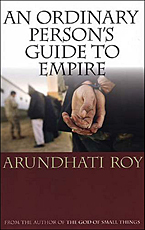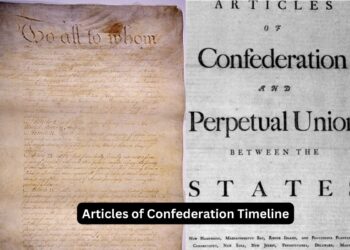An Ordinary Person’s Guide to Empire Essay Summary by Arundhati Roy
“An Ordinary Person’s Guide to Empire” is an essay written by Arundhati Roy, an Indian author, political activist, and outspoken critic of imperialism and globalization. Published in 2004, the essay examines the effects of empire-building and the dangers of unchecked globalization. Roy offers a scathing critique of the dominant global power structures and urges ordinary people to become aware and actively resist the oppressive forces at play.
The essay begins by discussing the impact of globalization, which Roy argues is a new form of imperialism. An Ordinary Person’s Guide to Empire by Arundhati Roy She asserts that globalization, driven by multinational corporations and powerful governments, prioritizes profit over people’s well-being and perpetuates inequalities and exploitation. Roy challenges the notion that globalization is an inevitable and positive force, instead highlighting its destructive consequences on vulnerable communities and the environment.
Also Read-
- The Clothing of Books Essay Summary by Jhumpa Lahiri
- Destroy All Monsters Essay Summary By Paul LaFarge
- Exactitude Essay Summary By Italo Calvino
Roy then delves into the concept of empire and the motivations behind its expansion. An Ordinary Person’s Guide to Empire by Arundhati Roy She argues that empire-building is driven by the desire for economic dominance, political control, and cultural hegemony. An Ordinary Person’s Guide to Empire by Arundhati Roy The essay critiques the United States as the dominant empire of our time, examining its role in military interventions, economic coercion, and the imposition of its values and interests on other nations.
The author emphasizes the role of resistance in challenging empire and promoting social justice. An Ordinary Person’s Guide to Empire by Arundhati Roy She highlights various forms of resistance, including grassroots movements, protests, and nonviolent actions. Roy advocates for a collective struggle against oppressive systems, urging ordinary people to come together and reclaim their power.
The essay also addresses the role of media in shaping public opinion and perpetuating the agendas of empire. Roy criticizes the mainstream media for its complicity in spreading propaganda and suppressing alternative narratives. An Ordinary Person’s Guide to Empire by Arundhati Roy She stresses the importance of seeking independent and diverse sources of information to counter the dominant narratives and challenge the status quo.
Roy concludes the essay by calling for solidarity among ordinary people across borders, cultures, and identities. An Ordinary Person’s Guide to Empire by Arundhati Roy She argues that by recognizing their shared struggles and connecting with each other, people can effectively challenge the structures of power and create a more just and equitable world.
“An Ordinary Person’s Guide to Empire” is a passionate and thought-provoking essay that confronts the damaging effects of imperialism and globalization. Through her incisive analysis, Roy exposes the injustices perpetuated by empire-building and urges individuals to engage in resistance and solidarity. An Ordinary Person’s Guide to Empire by Arundhati Roy The essay serves as a wake-up call to ordinary people, inviting them to question dominant narratives, challenge oppressive systems, and actively participate in the pursuit of a more just and equitable world.
Themes and Symbols
Themes:
- Imperialism and Globalization: The essay explores the themes of imperialism and globalization, critically examining their impact on marginalized communities and highlighting the unequal power dynamics inherent in these systems.
- Resistance and Social Justice: The theme of resistance runs throughout the essay, emphasizing the importance of challenging oppressive systems and working towards social justice. It calls for collective action and solidarity among ordinary people to bring about meaningful change.
- Media Manipulation: The essay discusses the theme of media manipulation, highlighting how mainstream media perpetuates dominant narratives and suppresses alternative perspectives. An Ordinary Person’s Guide to Empire by Arundhati Roy An Ordinary Person’s Guide to Empire by Arundhati Roy It underscores the need for independent and diverse sources of information to challenge the propaganda spread by the media.
- Solidarity and Collective Action: The theme of solidarity is central to the essay, emphasizing the power of unity among ordinary people across borders, cultures, and identities. An Ordinary Person’s Guide to Empire by Arundhati Roy It stresses the importance of collective action in challenging structures of power and creating a more just and equitable world.
Symbols:
- Empire: The concept of empire symbolizes the dominant global power structures and their pursuit of economic, political, and cultural dominance. It represents the oppressive forces at play and the systems that perpetuate inequality and exploitation.
- Resistance Movements: Resistance movements symbolize the collective action taken by ordinary people to challenge oppressive systems. They represent the power of grassroots movements, protests, and nonviolent actions in bringing about social change.
- Independent Media: Independent media symbolizes the alternative sources of information that challenge mainstream narratives. An Ordinary Person’s Guide to Empire by Arundhati Roy It represents the importance of seeking diverse perspectives and critical analysis to counter the manipulation and propaganda spread by dominant media outlets.
- Borders: Borders symbolize the divisions and boundaries imposed by oppressive systems. They represent the barriers that separate communities and perpetuate inequalities. An Ordinary Person’s Guide to Empire by Arundhati Roy An Ordinary Person’s Guide to Empire by Arundhati Roy The essay calls for crossing these borders and forging connections to foster solidarity and challenge the status quo.
- Justice: Justice symbolizes the desired outcome of resistance and collective action. An Ordinary Person’s Guide to Empire by Arundhati Roy It represents the pursuit of equality, fairness, and accountability. An Ordinary Person’s Guide to Empire by Arundhati Roy The essay emphasizes the importance of striving for social justice in the face of empire and oppression.
Conclusion
“An Ordinary Person’s Guide to Empire” is a powerful essay that critically examines the impact of empire-building and globalization. Arundhati Roy presents a scathing critique of the dominant global power structures, highlighting their destructive consequences on marginalized communities and the environment.
She emphasizes the importance of resistance, solidarity, and the pursuit of social justice in challenging oppressive systems. An Ordinary Person’s Guide to Empire by Arundhati Roy Through her passionate and thought-provoking analysis, Roy calls on ordinary people to become aware, question dominant narratives, and actively engage in the struggle against empire.
FAQ.
Q. Is “An Ordinary Person’s Guide to Empire” based on real events?
Ans. The essay is a work of non-fiction that examines real-world phenomena such as imperialism, globalization, and resistance movements. It draws upon historical and contemporary examples to support its arguments.
Q. What are the main themes of the essay?
Ans. The main themes explored in the essay include imperialism, globalization, resistance, social justice, media manipulation, and the power of ordinary people to effect change.
Q. Does the essay provide solutions or recommendations?
Ans. The essay encourages readers to become aware, resist oppressive systems, and build solidarity. While it doesn’t provide a detailed roadmap or specific solutions, it emphasizes the importance of collective action and the pursuit of social justice.
Q. What is the author’s perspective on globalization?
Ans. Arundhati Roy presents a critical perspective on globalization, viewing it as a new form of imperialism that prioritizes profit over people’s well-being. She highlights the negative consequences of globalization on vulnerable communities and argues for a more equitable and sustainable alternative.
Q. Is “An Ordinary Person’s Guide to Empire” accessible to readers without prior knowledge of the subject?
Ans. While some familiarity with concepts such as imperialism and globalization may be helpful, the essay is written in a clear and accessible manner, making it understandable to readers without extensive prior knowledge. It presents its arguments in a thought-provoking and engaging manner, inviting readers to critically examine the subject matter.
















